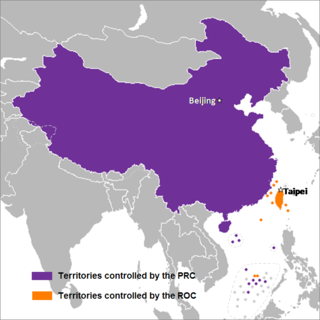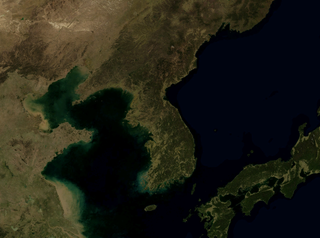Related Research Articles

The member states of the United Nations comprise 193 sovereign states. The United Nations (UN) is the world's largest intergovernmental organization. All members have equal representation in the UN General Assembly.
A United Nations General Assembly resolution is a decision or declaration voted on by all member states of the United Nations in the General Assembly.
China is one of the charter members of the United Nations and is one of five permanent members of its Security Council.

The United Nations General Assembly Resolution 2758 was passed in response to the United Nations General Assembly Resolution 1668 that required any change in China's representation in the UN be determined by a two-thirds vote referring to Article 18 of the UN Charter. The resolution, passed on 25 October 1971, recognized the People's Republic of China (PRC) as "the only legitimate representative of China to the United Nations" and removed "the representatives of Chiang Kai-shek" from the United Nations.

The Soviet Union was a charter member of the United Nations and one of five permanent members of the Security Council. Following the dissolution of the Soviet Union in 1991, its UN seat was transferred to the Russian Federation, the successor state of the USSR.
Dong Biwu was a Chinese communist revolutionary and politician, who served as acting Chairman of the People's Republic of China between 1972 and 1975.
The United Nations General Assembly Resolution 505 is titled Threats to the political independence and territorial integrity of China and to the peace of the Far East, resulting from Soviet violations of the Sino-Soviet Treaty of Friendship and Alliance of August 14, 1945 and from Soviet violations of the Charter of the United Nations. The UN General Assembly adopted this resolution on 1 February 1952 during its sixth session after the Republic of China complained to the United Nations against the Soviet Union.

The Formosa Resolution of 1955 was a joint resolution passed by the U.S. Senate and signed by U.S. President Dwight D. Eisenhower on January 29, 1955, to counteract the threat of an invasion of Taiwan by the People's Republic of China (PRC). The resolution gave the U.S. president the authority “to employ the Armed Forces of the United States as he deems necessary for the specific purpose of securing and protecting Formosa and the Pescadores against armed attack [by the Communists]”.

Yakov Aleksandrovich Malik was a Soviet diplomat.

United Nations Command is the multinational military force established to support the Republic of Korea during and after the Korean War. It was the first international unified command in history, and the first attempt at collective security pursuant to the Charter of the United Nations.
An exclusive mandate is a government's assertion of its legitimate authority over a certain territory, part of which another government controls with stable, de facto sovereignty. It is also known as a claim to sole representation or an exclusive authority claim. The concept was particularly important during the Cold War period when a number of states were divided on ideological grounds.

The term "Two Chinas" refers to the geopolitical situation where two political entities exist under the name "China".

United Nations Security Council Resolution 82 was a measure adopted by the United Nations Security Council (UNSC) on June 25, 1950. The resolution condemned the "armed attack on the Republic of Korea by forces from North Korea", while calling for "the immediate cessation of hostilities" and for "the authorities in North Korea to withdraw forthwith their armed forces to the 38th parallel". The measure was adopted by a vote of 9 support, none opposed, and one abstention. The resolution passed since the Soviet Union was boycotting the UN for recognising Republic of China as China.

United Nations Security Council Resolution 83, adopted on June 27, 1950, determined that the attack on the Republic of Korea by forces from North Korea constituted a breach of the peace. The Council called for an immediate cessation of hostilities and for the authorities in North Korea to withdraw their armed forces to the 38th parallel. They also noted the report by the United Nations Commission on Korea that stated North Korea's failure to comply with Security Council Resolution 82 and that urgent military measures were required to restore international peace and security.

The United Nations Security Council Resolution 84, adopted on July 7, 1950, was the United Nations Security Council resolution which authorized the formation of the United Nations Command to provide military support for South Korea, following a North Korean invasion and offensive at the outbreak of the Korean War.

The permanent members of the United Nations Security Council are the five sovereign states to whom the UN Charter of 1945 grants a permanent seat on the UN Security Council: China, France, Russia, the United Kingdom, and the United States.

The Republic of Korea and the Democratic People's Republic of Korea were simultaneously admitted to the United Nations (UN) in 1991. On 8 August 1991, the UN Security Council passed United Nations Security Council Resolution 702, recommending both states to the UN General Assembly for membership. On 17 September 1991, the General Assembly admitted both countries under Resolution 46/1.

The United Nations General Assembly resolution 498 was approved on February 1, 1951, in response to the intervention of Chinese Communist troops in Korean War.

On April 13, 1919, the Republic of China recognized the Provisional Government of the Republic of Korea. The Nationalist government of China participated in the Cairo Conference which resulted in the Cairo Declaration with the aim of freeing Korea and Taiwan from Japanese colonial rule. After the communist takeover of Mainland China in 1949 and the establishment of the Democratic People's Republic of Korea in 1948, relations between the two are non-existent, however, unofficial relations are significant.
The People's Republic of China was established in 1949 and was not recognized by the United Nations (UN) as the legitimate government of China until 1971. Prior to then, the Republic of China represented the interests of China, with both it and the PRC claiming to be the only legitimate representative of whole China. In 1950, the PRC requested its admission to the UN and the expulsion of the representatives of the Kuomintang from the United Nations Security Council; the request was unsuccessful, after which the Soviet Union initiated a boycott of the UN. Following that, annual motions for the PRC's recognition were introduced by a variety of UN member states, until the PRC was formally recognized in October 1971.
References
- 1 2 3 Chai, Winberg (1970). "China and the United Nations: Problems of Representation and Alternatives". Asian Survey. 10 (5): 397–398. doi:10.2307/2642389. ISSN 0004-4687. JSTOR 2642389.
- 1 2 3 Chai, Winberg (1970).p.398
- 1 2 Chai, Winberg (1970).p.399
- ↑ Torelli, Angela (2012). "The Costs of Realism: The Nixon Administration, the People's Republic of China, and the United Nations". The Journal of American-East Asian Relations. 19 (2): 157–182. doi:10.1163/18765610-01902001. ISSN 1058-3947. JSTOR 23613339.
- 1 2 "Russia ends her U.N.O boycott". The West Australian . 1950-07-29. Retrieved 2023-06-24.
- ↑ "Soviets Boycott United Nations Security Council (1950) - January 13th". sites.google.com. Retrieved 2023-06-24.
- ↑ "Soviet Russia's boycott of the United Nations". Sydney Morning Herald . 1950-04-19. Retrieved 2023-06-24.
- 1 2 3 Pak, Chi Young (2000-01-01), "The Korean War and the United Nations", Korea and the United Nations, Brill Nijhoff, pp. 77–78, ISBN 978-90-04-47867-1 , retrieved 2023-06-24